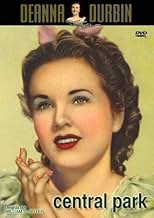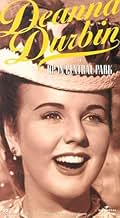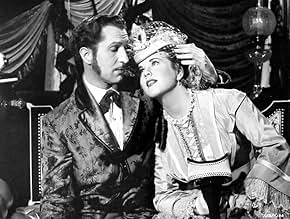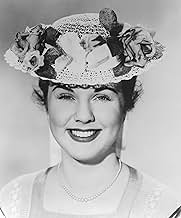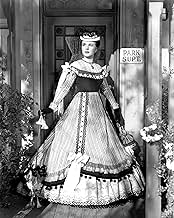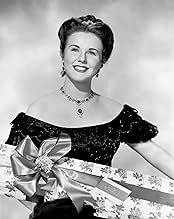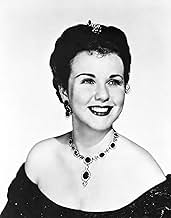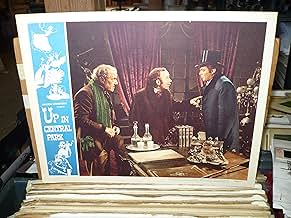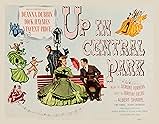Aggiungi una trama nella tua linguaA newspaper reporter and the daughter of an immigrant maintenance man help expose political corruption in New York City.A newspaper reporter and the daughter of an immigrant maintenance man help expose political corruption in New York City.A newspaper reporter and the daughter of an immigrant maintenance man help expose political corruption in New York City.
- Regia
- Sceneggiatura
- Star
Nellie Fisher
- Dancer
- (as Nelle Fisher)
Boyd Ackerman
- Policeman
- (non citato nei titoli originali)
Patricia Alphin
- Guest
- (non citato nei titoli originali)
Alice Backes
- Swedish Immigrant Girl
- (non citato nei titoli originali)
G. Pat Collins
- Ward Heeler
- (non citato nei titoli originali)
Recensioni in evidenza
Up In Central Park marked a successful return to Broadway for Sigmund Romberg as this musical about the Tammany Hall era of Boss William Marcy Tweed ran for 504 performances during the 1945-46 season on Broadway. Instead of the elegant Vincent Price as the powerful Boss of Tammany Hall Civil War and post Civil War, the part was played by Noah Beery, Sr. Now that certainly would have called for a different kind of Boss Tweed.
Musically what Universal Studios gave us is a half baked version of the Broadway Show. Dick Haymes and Deanna Durbin are in good voice for th Sigmund Romberg-Dorothy Fields numbers still left, but because the music is cut the emphasis of the film turns to Price.
Young Deanna Durbin and her father Albert Sharpe are freshly arrived from Ireland and immediately as was the tradition back in the day, welcomed to the shores by the Tammany political machine. Sharpe takes to the repeat voting the way that Brian Donlevy did in The Great McGinty, but his rise only consists of becoming the superintendent of Central Park which the Tweed Ring plans to 'improve' with many kickbacks for themselves.
In the meantime Durbin comes to the attention of Price, but she also comes to the attention of crusading reporter Dick Haymes. They make beautiful music together and apart in what little is left of the Romberg-Fields score.
If Up In Central Park had been done at MGM it surely would have gotten the production needed for this musical. Unforgivably the big hit song of the film Close As Pages In A Book was not performed and it's a duet which I'm sure Haymes and Durbin would have been great at. I'm betting it ended on the cutting room floor. Close As Pages In A Book is heard on the soundtrack as background music
There's another nice song called It Doesn't Cost You Anything To Dream that was also cut. But what I was most disappointed in was a number called The Fireman's Bride that was not included. It's a rollicking number that I have a recording of Jeanette MacDonald and Robert Merrill doing and I'm sure it must have been great on stage. When it wasn't in the film I was truly disappointed.
Casting Vincent Price as Tweed was a stroke of genius. I truly think that a young woman's virtue would have been far more in danger from him than from Noah Beery. Remembering the villains Beery played on screen, he would have to get really overbearing and physical which he must have on stage.
As a musical Up In Central Park is disappointing, but fans of Vincent Price will appreciate this actor displaying the fact he could do far more than horror films.
Musically what Universal Studios gave us is a half baked version of the Broadway Show. Dick Haymes and Deanna Durbin are in good voice for th Sigmund Romberg-Dorothy Fields numbers still left, but because the music is cut the emphasis of the film turns to Price.
Young Deanna Durbin and her father Albert Sharpe are freshly arrived from Ireland and immediately as was the tradition back in the day, welcomed to the shores by the Tammany political machine. Sharpe takes to the repeat voting the way that Brian Donlevy did in The Great McGinty, but his rise only consists of becoming the superintendent of Central Park which the Tweed Ring plans to 'improve' with many kickbacks for themselves.
In the meantime Durbin comes to the attention of Price, but she also comes to the attention of crusading reporter Dick Haymes. They make beautiful music together and apart in what little is left of the Romberg-Fields score.
If Up In Central Park had been done at MGM it surely would have gotten the production needed for this musical. Unforgivably the big hit song of the film Close As Pages In A Book was not performed and it's a duet which I'm sure Haymes and Durbin would have been great at. I'm betting it ended on the cutting room floor. Close As Pages In A Book is heard on the soundtrack as background music
There's another nice song called It Doesn't Cost You Anything To Dream that was also cut. But what I was most disappointed in was a number called The Fireman's Bride that was not included. It's a rollicking number that I have a recording of Jeanette MacDonald and Robert Merrill doing and I'm sure it must have been great on stage. When it wasn't in the film I was truly disappointed.
Casting Vincent Price as Tweed was a stroke of genius. I truly think that a young woman's virtue would have been far more in danger from him than from Noah Beery. Remembering the villains Beery played on screen, he would have to get really overbearing and physical which he must have on stage.
As a musical Up In Central Park is disappointing, but fans of Vincent Price will appreciate this actor displaying the fact he could do far more than horror films.
UP IN CENTRAL PARK (Universal-International, 1948), directed by William A. Seiter, stars Deanna Durbin in her next to last movie of her career. For her first 1948 release, she stars in a light-hearted period piece based on a popular 1945 musical play of the same name by Dorothy and Herbert Fields. Aside from some changes from stage to screen regarding both story and selected song tunes, the film in general is livably typical Durbin material which allows her to change from teenage Irish girl in pig-tails to attractive young woman. What's most interesting here is casting Durbin opposite Vincent Price (then not quite the horror film actor he was to become years later) in his rare occasion cast in a musical story. Though Price would have done very well in the singing category, all major vocals go to the pleasing voices by Durbin and 20th Century-Fox alumni, Dick Haymes.
In spite of the title, the 88 minute story is not set entirely in Central Park. However, it takes place in 1870s New York City where the plot introduces William Marcy Treed (Vincent Price), a corrupt political boss of the Tammany Hall Society advocating the re- election of weak and drunken candidate, Mayor Oakley (Hobart Cavanaugh,) back in office so to resume his crooked deals. Going against Treed is New York Times reporter John Matthews (Dick Haymes) out to expose him, but because of his lack of evidence that would stand up on court, he's unable to do so. Later on a boat arriving from Europe to Ellis Island are immigrants, including that of Rosie (Deanna Durbin) and her widower father, Timothy Moore (Arthur Sharpe) coming to their land of opportunity where Rosie hopes to become a great opera singer. Soon after, Mr. Moore is met by Regan (Tom Powers), one of Tweed's associates offering naive immigrants extra money voting straight candidate tickets under names of those unable to cast a ballot, namely the sick and deceased, even without being American citizens. Offered $2 a vote, Mr. Moore earns $50 for voting 23 times for Oakley. Having fallen asleep in Tweed's office while awaiting to meet with him, Treed, believing Rosie has overheard him discussing with the board about embezzling funds through unnecessary renovation of Central Park, gets on her good graces by offering her father a $3,000 a year job as park superintendent plus living accommodations inside Central Park. As much as Rosie feels Tread to be a great man of honor, it's up to Matthews, who has taken an interest in the young lady, to convince her otherwise.
With music and lyrics by Sigmund Romberg and Dorothy Fields, the motion picture soundtrack is as follows: "Vote for Treed" (sung by candidates); "Oh Say Do You See What I See" (sung by Deanna Durbinb); "Carousel in the Park" (sung by Dick Haymes and Deanna Durbin); "The Ice Skating Ballet" (photograph come to life sequence choreographed by Helen Tamiras); "When She Walks in the Room" (sung by Dick Haymes); "Pace, Pace Mio Mio" and Giuseppe Verdi's Opera LA FORZE DEL DESTINO (sung by Durbin); and "The Waiter/Can-Can Dance" (instrumental). Though the songs are proved satisfactory, including Durbin's "Oh Say Do You See" number and a couple of Dick Haymes song interludes, they are, in the most part, unmemorable.
While the legacy of Universal Studio rests mostly on its reputation for horror films and/or Abbott and Costello comedies, one of the biggest money makers for the studio since 1936 were those films starring Deanna Durbin. Making no attempt speaking with an Irish brogue, which is left to the Barry Fitzgerald sounding voice of co-star, Arthur Sharpe, Durbin's Rosie is less typical Irish stereotype than most, though her Irish temper does flare up on a couple of occasions with her giving face slaps to those who make her angry. When watching Durbin playing opposite Vincent Price, one would have to feel their missed opportunity for not being cast together in the sound remake of THE PHANTOM OF THE OPERA (1943), in place of the casting of Susanna Foster and Claude Rains. Interestingly with this combination for UP IN CENTRAL PARK that Price presence gathers the most attention with his scene stealing performance, while Arthur Sharpe gets some moments to himself in a scene where he attempts to get his education by learning to read by attending school seated in a classroom surrounded by third grade students.
A satisfactory presentation with authentic recreated costumes and settings that blend in perfectly with its time frame, it's a wonder why it wasn't produced in Technicolor. Though UP IN CENTRAL PARK did have some limited TV revivals in the 1980s, especially on public broadcasting television, it did become available on video cassette in 1998 and years later on DVD as part of the Deanna Durbin collection, simply indicating the Durbin name isn't as unknown or forgotten as legend may have it believed to be. (***)
In spite of the title, the 88 minute story is not set entirely in Central Park. However, it takes place in 1870s New York City where the plot introduces William Marcy Treed (Vincent Price), a corrupt political boss of the Tammany Hall Society advocating the re- election of weak and drunken candidate, Mayor Oakley (Hobart Cavanaugh,) back in office so to resume his crooked deals. Going against Treed is New York Times reporter John Matthews (Dick Haymes) out to expose him, but because of his lack of evidence that would stand up on court, he's unable to do so. Later on a boat arriving from Europe to Ellis Island are immigrants, including that of Rosie (Deanna Durbin) and her widower father, Timothy Moore (Arthur Sharpe) coming to their land of opportunity where Rosie hopes to become a great opera singer. Soon after, Mr. Moore is met by Regan (Tom Powers), one of Tweed's associates offering naive immigrants extra money voting straight candidate tickets under names of those unable to cast a ballot, namely the sick and deceased, even without being American citizens. Offered $2 a vote, Mr. Moore earns $50 for voting 23 times for Oakley. Having fallen asleep in Tweed's office while awaiting to meet with him, Treed, believing Rosie has overheard him discussing with the board about embezzling funds through unnecessary renovation of Central Park, gets on her good graces by offering her father a $3,000 a year job as park superintendent plus living accommodations inside Central Park. As much as Rosie feels Tread to be a great man of honor, it's up to Matthews, who has taken an interest in the young lady, to convince her otherwise.
With music and lyrics by Sigmund Romberg and Dorothy Fields, the motion picture soundtrack is as follows: "Vote for Treed" (sung by candidates); "Oh Say Do You See What I See" (sung by Deanna Durbinb); "Carousel in the Park" (sung by Dick Haymes and Deanna Durbin); "The Ice Skating Ballet" (photograph come to life sequence choreographed by Helen Tamiras); "When She Walks in the Room" (sung by Dick Haymes); "Pace, Pace Mio Mio" and Giuseppe Verdi's Opera LA FORZE DEL DESTINO (sung by Durbin); and "The Waiter/Can-Can Dance" (instrumental). Though the songs are proved satisfactory, including Durbin's "Oh Say Do You See" number and a couple of Dick Haymes song interludes, they are, in the most part, unmemorable.
While the legacy of Universal Studio rests mostly on its reputation for horror films and/or Abbott and Costello comedies, one of the biggest money makers for the studio since 1936 were those films starring Deanna Durbin. Making no attempt speaking with an Irish brogue, which is left to the Barry Fitzgerald sounding voice of co-star, Arthur Sharpe, Durbin's Rosie is less typical Irish stereotype than most, though her Irish temper does flare up on a couple of occasions with her giving face slaps to those who make her angry. When watching Durbin playing opposite Vincent Price, one would have to feel their missed opportunity for not being cast together in the sound remake of THE PHANTOM OF THE OPERA (1943), in place of the casting of Susanna Foster and Claude Rains. Interestingly with this combination for UP IN CENTRAL PARK that Price presence gathers the most attention with his scene stealing performance, while Arthur Sharpe gets some moments to himself in a scene where he attempts to get his education by learning to read by attending school seated in a classroom surrounded by third grade students.
A satisfactory presentation with authentic recreated costumes and settings that blend in perfectly with its time frame, it's a wonder why it wasn't produced in Technicolor. Though UP IN CENTRAL PARK did have some limited TV revivals in the 1980s, especially on public broadcasting television, it did become available on video cassette in 1998 and years later on DVD as part of the Deanna Durbin collection, simply indicating the Durbin name isn't as unknown or forgotten as legend may have it believed to be. (***)
This movie is a delight to see with a plot to give Deanna Durbin again a way to showcase her vocal talent as always. The only issue I had was that Deanna did not speak with an Irish brogue which kind of throws off where she originates from in the movie (Ireland). My guess is that she may have tried to do this prior to filming with her unlimited talent but may not have worked and the producers decided to scrap it. On the whole, however, it is definitely worth watching. (Who else but Vincent Price could portray the schemer Boss Tweed?)
Not a bad film, in fact quite good, just a little underwhelming at the same time. It has a lot of things to like, there are a lot of omissions(We'll be close as Pages in a Book- though it's used as a cue at the end- and Fireman's Bride being the glaring omissions) but the music is still absolutely beautiful, the sprightly Oh Say, Can You See standing out. Pace, Pace Mio Dio from La Forza Del Destino is beautifully sung and is one of Verdi's best but most difficult soprano arias. The script is delightfully witty, and the story while not the most exceptional in the world is compelling. The choreography and dancing is professional and danced with elegance. In terms of scenes, Durbin's and Price's scenes are a joy but the highlight is the great Currier and Ives ballet. Deanna Durbin is just radiant and brings girlish naiveté to good effect, she's in great voice too, love the richness. Vincent Price is perfectly cast, while he's at his best in the menacing yet sympathetic roles he'd take on later it's easy to love how suave, handsome, smarmy and charismatic he is. Albert Sharpe is also good. Other than the omissions of some of the best songs of Up in Central Park or reducing them to musical cues, the scant length and Dick Haymes' at times likable but stiff performance(he does have a nice voice though and in all fairness his material is not as juicy as Durbin's and Price's), it's in the production values where Up in Central Park falls down most on. The costumes are fine, but the sets are rather stuffy and the use of locations are far too restricted, any opportunities of seeing the locations properly are not used to full effect and the likes of the zoo and carousel are only seen in as much as a few shots. In conclusion, a pleasant film and a good vehicle for Durbin(essentially what it was billed as)- though Price comes extremely close to stealing the show from under her- but at the same time it's disappointing. 6/10 Bethany Cox
Durbin and Price are in top form; both are charming, and hit just the right light note in their acting style. Dick Haymes sings very well, but lacks charisma and spark as an actor. The actor playing Durbin's Irish father is strictly from the Barry Fitzgerald school of ersatz Blarney.
Contrary to what another reviewer said, this 100% soundstange shot film shows all to clearly that Universal didn't spend much money on it. Sets are unusually limited in scope for a musical. One example: In one number immigrant Durbin on the deck of a boat coming to America sings about the new countries glories. Not only is the boat deck tiny with the only backdrop a painted sky, but there is not one shot showing what she is singing about, what is supposedly inspiriting her song.
The plot and characters are hardly realistic, but work just fine for a musical. The dialog is well written, better than in the majority of musicals of this era.
The music, what there is of it, has big, well written orchestrations, and the fidelity is excellent on the VHS tape. Johnny Green is credited as composer- music director, and I believe he was head of MGM's music department at the time, so I suspect Universal farmed out musical duties to MGM (L.B. Mayor was father in law to Universal's chief). If so, it was a good decision.
As was standard practice in this era, only a few of the songs written for the stage show on which the film was based made it to the film. The glaring omission is "We'll Be Close As Pages In A Book", which I believe is the only song from the theater production to become popular and have a life outside of the show. It's not in the film, but is very prominently featured in the instrumental title music and is the music which closes the film. Makes me suspect they filmed the song, but cut it before the film was released.
Contrary to what another reviewer said, this 100% soundstange shot film shows all to clearly that Universal didn't spend much money on it. Sets are unusually limited in scope for a musical. One example: In one number immigrant Durbin on the deck of a boat coming to America sings about the new countries glories. Not only is the boat deck tiny with the only backdrop a painted sky, but there is not one shot showing what she is singing about, what is supposedly inspiriting her song.
The plot and characters are hardly realistic, but work just fine for a musical. The dialog is well written, better than in the majority of musicals of this era.
The music, what there is of it, has big, well written orchestrations, and the fidelity is excellent on the VHS tape. Johnny Green is credited as composer- music director, and I believe he was head of MGM's music department at the time, so I suspect Universal farmed out musical duties to MGM (L.B. Mayor was father in law to Universal's chief). If so, it was a good decision.
As was standard practice in this era, only a few of the songs written for the stage show on which the film was based made it to the film. The glaring omission is "We'll Be Close As Pages In A Book", which I believe is the only song from the theater production to become popular and have a life outside of the show. It's not in the film, but is very prominently featured in the instrumental title music and is the music which closes the film. Makes me suspect they filmed the song, but cut it before the film was released.
Lo sapevi?
- QuizDuring filming, sepia (brownish) tone was tested in a few scenes, but the released picture is entirely in standard black and white.
- BlooperWhen Timothy Moore is learning to read , he reads from Beatrix Potter's Tale of Peter Rabbit , which wasn't published until 1902 .
- Colonne sonoreOh Say, Can You See (What I See)
(uncredited)
Music by Sigmund Romberg
Lyrics by Dorothy Fields
Sung by Deanna Durbin
I più visti
Accedi per valutare e creare un elenco di titoli salvati per ottenere consigli personalizzati
Dettagli
- Data di uscita
- Paese di origine
- Lingua
- Celebre anche come
- Quiéreme otra vez
- Luoghi delle riprese
- Azienda produttrice
- Vedi altri crediti dell’azienda su IMDbPro
- Tempo di esecuzione1 ora 24 minuti
- Colore
- Proporzioni
- 1.37 : 1
Contribuisci a questa pagina
Suggerisci una modifica o aggiungi i contenuti mancanti

Divario superiore
By what name was Up in Central Park (1948) officially released in India in English?
Rispondi
